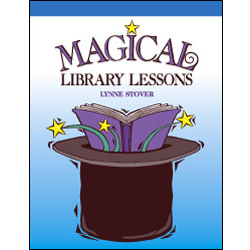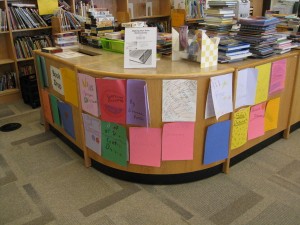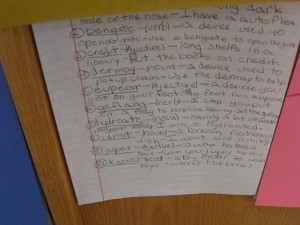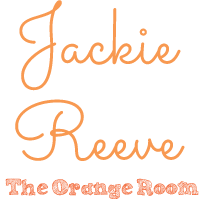 My predecessor left behind a bunch of resource books at work, including Magical Library Lessons by Lynne Stover. When it came time to do my Dictionary lesson with the 4th graders in February, I found a great idea in this book. It’s based on a dictionary made by Klaus in A Series of Unfortunate Events, who makes up his own horrible words when there aren’t any available to describe the situation of the Baudelaire children.
My predecessor left behind a bunch of resource books at work, including Magical Library Lessons by Lynne Stover. When it came time to do my Dictionary lesson with the 4th graders in February, I found a great idea in this book. It’s based on a dictionary made by Klaus in A Series of Unfortunate Events, who makes up his own horrible words when there aren’t any available to describe the situation of the Baudelaire children.
Unfortunately, maybe half a dozen of my 4th graders had heard of the Lemony Snicket books or ever read one. A couple more had seen the movie, but my kids really had no idea what I was talking about. So this didn’t get us off to a great start, but we ran with what we knew.
Anyway, the lesson plan said it would take 30-45 (1-2 class periods for me), and it provided a list of entirely made up words. The idea is that the kids have to pick 10 of the fake words from the list and make their own dictionaries defining them.
It was a great idea, but boy did we struggle with this. It took well over a month to do (probably 6 classes at least), and I still have kids who didn’t finish. I eventually just had to stop and display what had been completed so we could move on.
 The kids know how to look up words in the dictionaries, but getting them to examine dictionary entries was tough. I was trying to build on skills I know they have already, but with a fun project that would let them be creative. The kids were asked to write the word, decide what part of speech it would be (noun, verb, adjective, or adverb), create a definition for the word, and use it in a sentence. It needed to be in alphabetical order, and when they were done they could create a fun cover out of construction paper and name the dictionary whatever they wanted. All the words could be part of a theme they made up, or they could be random. I started by showing the kids the different kinds of dictionaries that are out there (geographical, biographical, etc.), and I gave every table a real children’s dictionary so they could analyze how the entries look and how definitions are phrased.
The kids know how to look up words in the dictionaries, but getting them to examine dictionary entries was tough. I was trying to build on skills I know they have already, but with a fun project that would let them be creative. The kids were asked to write the word, decide what part of speech it would be (noun, verb, adjective, or adverb), create a definition for the word, and use it in a sentence. It needed to be in alphabetical order, and when they were done they could create a fun cover out of construction paper and name the dictionary whatever they wanted. All the words could be part of a theme they made up, or they could be random. I started by showing the kids the different kinds of dictionaries that are out there (geographical, biographical, etc.), and I gave every table a real children’s dictionary so they could analyze how the entries look and how definitions are phrased.
Week after week I had kids repeatedly asking me why they couldn’t find the made up words in the dictionary; for some it never fully clicked that they were inventing the definitions, no matter how often I explained it. Others struggled with alphabetical order. And more still didn’t understand the difference between the definition of the word and using it in a sentence. So for example, one of the fake words was “autoflex.” So there were a lot of entries that looked like this: autoflex. verb. I autoflexed my car. I sat with some of the kids week after week trying to get them to see that we don’t know what “autoflex” means from that sentence. What is the definition of the word? It was really tough for some of them, but we did our best.
 It was frustrating, and next year I’m not sure how I’ll do this unit. I don’t know if it’s too difficult a project for my students, or if I just need to approach it differently. Out of let’s say 50+ fourth graders, I have maybe 20 finished products where the students clearly understood what to do and were able to finish. But the finished projects we did get were pretty cool.
It was frustrating, and next year I’m not sure how I’ll do this unit. I don’t know if it’s too difficult a project for my students, or if I just need to approach it differently. Out of let’s say 50+ fourth graders, I have maybe 20 finished products where the students clearly understood what to do and were able to finish. But the finished projects we did get were pretty cool.
